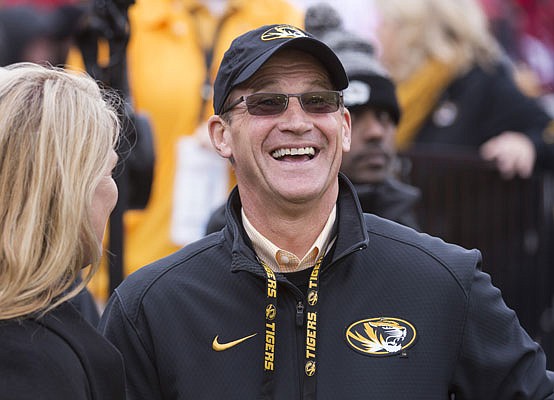COLUMBIA - The University of Missouri's athletic department operated at a budget deficit for the third consecutive year, according to audited financial statements every NCAA institution is required to submit to the governing body of collegiate athletics which the News Tribune obtained by open records request.
For the fiscal year running from July 1, 2018 to June 30, 2019, Missouri reported total operating revenues of $106,610,244 and total operating expenses of $108,398,447, a gap of $1.79 million. Athletic spending and revenues have generally increased annually for the program since Missouri joined the Southeastern Conference in 2012, though MU's overall spending and revenue decreased slightly from FY 2018.
Expenses decreased from $109,158,522 in the previous fiscal year, and revenues decreased from $107,351,581, both decreases of about $740,000, or seven-tenths of a percent. Missouri also decreased its overall deficit from $1,806,941 a year ago.
MU saw increases in three of its top five sources of revenue: Missouri's media rights payout increased $158,165 to $38,214,046; direct contributions increased $880,701 to $26,507,182 and the SEC's non-media, non-bowl distribution surpassed $10 million for the first time, an increase of $530,854 to $10,212,586. The SEC announced Thursday it had disbursed an average of $44.6 million to each school in non-bowl revenue in FY18, which includes money from media rights, the SEC football championship game and men's basketball tournament, as well as the College Football Playoff and other NCAA championship events.
Missouri's ticket revenue decreased by more than $1.3 million, and has dropped in four consecutive years in a steady decline from the $23.4 million in ticket sales Missouri reported in FY2015. Among MU's seven biggest sports by ticket revenue - football, men's basketball, women's basketball, softball, baseball, wrestling and volleyball - decreases in ticket revenue from the previous report include three of the top four: men's basketball (15.8 percent), volleyball (14.8 percent), football (9.3 percent), and softball (8.8 percent).
Football ticket sales are down 41 percent from the peak of FY 2015, while men's basketball ticket revenue is 15 percent lower than the spike in FY18, but is still almost 43 percent higher than in Kim Anderson's last season at Missouri. Volleyball, meanwhile, has seen an 800 percent growth in ticket revenue, from $4,284 in FY15 to $38,741 this past year.
The men's basketball team has seen fluctuations in ticket sales corresponding to team success and preseason hype for the arrival of Michael Porter Jr. and Jontay Porter, but football ticket sales have continually decreased. These numbers reflect Cuonzo Martin's second season, in which the Tigers went 15-17 and missed the postseason, and the 2018-19 football season, in which Barry Odom's Missouri team went 8-5 with a loss in the Liberty Bowl to Oklahoma State.
Missouri may see no change or a slight increase in football ticket sales in the coming fiscal year, as the completion of the south end zone re-opened space for about 4,000, much of it premium seating, which requires a donation to the athletic scholarship fund. MU also saw an increase in average attendance, from 51,446 in 2018 to 54,160 this past season, according to its attendance figures.
The 2020 fiscal year, which began July 1, 2019, will factor in Missouri's firing of Odom and the seven members of his assistant coaching staff, who all have buyouts offset by future employment, as well as the financial penalties associated with the NCAA's upheld sanctions in Missouri's academic fraud case. MU will not receive its SEC disbursement, which includes the pooled and shared revenues from nine bowl games, including the College Football Playoff, which LSU won, and two other non-CFP New Year's Six bowls, the Orange and Sugar Bowls.
Missouri has estimated the lost revenue will be approximately $9-10 million, a shortfall the University will cover with loans. Half of that money will be split between the other 13 conference programs and half will be held and given to Missouri if the football program remains sanction-free for the next few years.
The athletic department's spending on debt service, leases and rental fees increased from $6.67 million in FY18 to $11.1 million this past year with the construction of the new south end zone complex at Memorial Stadium, nearly doubling its previous spending.

